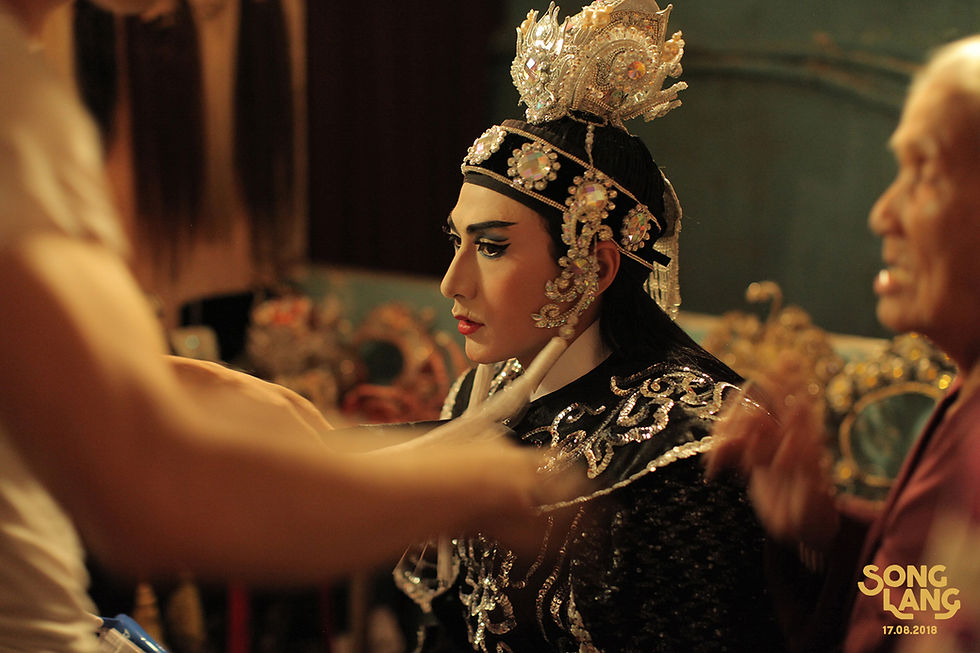Chapter 02: Song Lang and the Arts of Silence
- Long Vu
- Oct 29, 2025
- 4 min read
In cinema, we have movies like The Social Network where dialogue is the driving force behind all happenings, and then there is Song Lang.
Instead of dialogue, Song Lang capitalizes on the power of unspoken emotions to deliver its characters story.
Song Lang is extremely economical when it comes to dialogue, and yet, this is one of its golden selling point. When words fall back, emotions take the front stage - the lack of dialogue in Song Lang draws attention to the subtle acting and reinforces the power of the images.
The first time Dung met Linh Phung, there are so many things he could have said - so many things he would have wanted to say. “How does it feel it to be up there?”, “What is it like to be blinded by the stage light?”, “What do you think when the audience applauded you?”, “What does it feel like to belong to the stage - can I ever have that feeling?” Yet, the words sit bitterly on the tip of his tongue, not even a warning, or a jump scare, which would have also made sense since Dung was supposed to be collecting debt from the theatre. No, all there was to it was silence, a deafening silence that entrenches all time and space, leaving only Dung and Linh Phung standing face to face, each wrestling with his own demon - and all of these were perfectly conveyed through the skillful acting of the eyes.
In certain ways, the lack of dialogues serve more than just highlighting Isaac and Liem Binh Phat’s impressive acting - it feels like it has to be that way. Dung and Linh Phung, two lonely men in a lonely world, have gone through so much in this life. Their hearts have been so scared on the surface that they become numb to all world’s happenings, yet beating violently beneath that is a powerful yearning for life, for feelings and emotions and acceptance of the inner child - the child whose mother did not walk away, the child who did not go down that violent path, the child who was not an orphan, the child who can stand on the stage without being constantly reminded of how his parents died that fateful day. What words can possible capture those feelings?
Song Lang made the most of Hollywood’s golden rule - show, don’t tell - and it allows the movie to gain an entirely different layer of meaning, one that falls somewhere in the gray area, that belongs to the viewers’ interpretations and their interpretations alone.
In Song Lang, Dung and Linh Phung’s relationship was developed more through silence than dialogue.
Through out the movie, perhaps the only recurring sound was the sound of Cai Luong. If the silence represents each character’s repressed emotions, Cai Luong is their means of escaping. Songs after songs, chapters after chapters, from the grandiose stage of the theatre to the dark alley ways and sun bathed windowsill, every time Cai Luong is played in the movie, it whooshed pass the atmosphere like a striking arrow, tearing apart the suffocating silence and making its way for the stories to take front stage. Through the poignant yet tormented lyrics, the audience is gradually introduced to Dung and Linh Phung’s inner worlds, those that enfolded in parallel with the play on stage, that intertwine with its every line, word, and emotion.
Yet, there is a criticism here. Even though Cai Luong is supposed to be at the center of the movie, it ends up feeling like a convenient prawn that could easily be replaced by some other forms of arts.
The recurring motivation through out the movie was Dung and Linh Phung’s mutual love, or rather connection, with Cai Luong. Linh Phung gave up everything to embark on this journey - his parents died on the night he first stood on stage. Dung was born into a family of Cai Luong artists - his mother left him in chase of this arts’ glory. They both met each other because of their mutual love for Cai Luong, and they both reveal their true selves over the poignant sound of Song Lang. Every important stage of their lives, from childhood to adulthood, is tied to some aspect of Cai Luong, yet what is so specific about this arts that captivates them? Why not Tuong, or Cheo, or any other traditional art forms?
In Song Lang, Cai Luong takes a surprising side role despite its supposed centrality in the movie.
Dung once said that he gave up on Cai Luong because it reminded him too much of how two-faced human beings are, of how his mom easily discarded him for glory and stability the way she discarded her masks once she is off-stage. To him, Cai Luong is fake, but what art form is not fake? This could have been a great chance for the director to solidify the importance of Cai Luong in this movie, but its convenient treatment has undermined the potential this art form harbors, making it nothing more than a rumination of the past and an object of fascination.



Comments